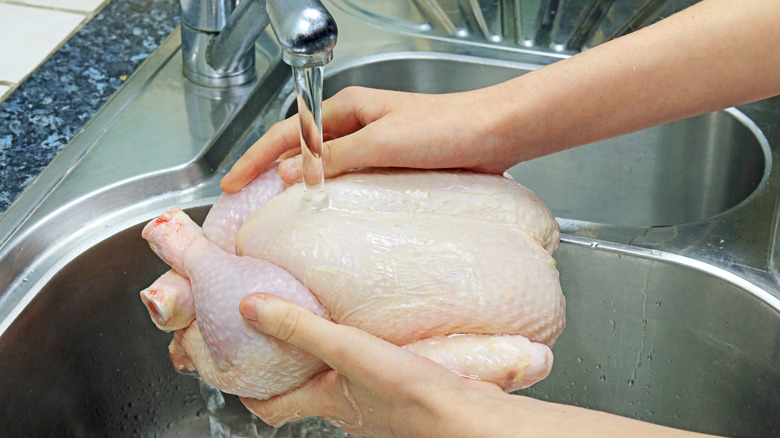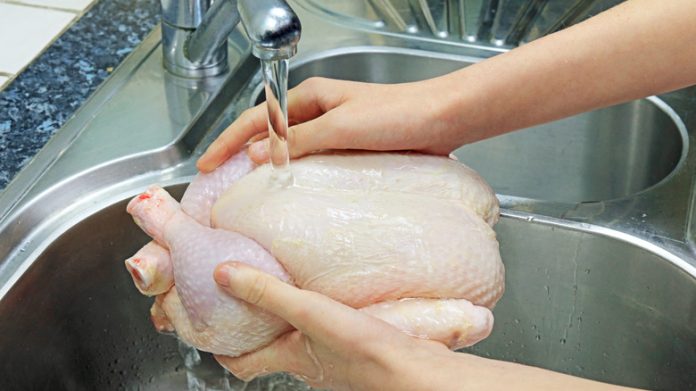Contrary to what your elders may have advised, it is not necessary to wash raw chicken or any other type of meat before preparing and cooking it. In fact, experts from the US Department of Agriculture and other food safety authorities discourage this practice. Here’s why:
When washing chicken, harmful bacteria like salmonella can easily spread to your kitchen surfaces, potentially contaminating other ingredients. A 2019 study by the USDA found that 60% of cooks who washed raw chicken had bacteria in their sinks. Chef-instructor Shawn Matijevich from the Institute of Culinary Education in New York City explains, “You may not realize how much bacteria you are spraying all over the place. It only takes a small amount to contaminate everything.”

According to Matijevich, bacteria does not spread through the air, but rather through contact with surfaces. Therefore, it is best to minimize the number of times you handle raw poultry or allow it to come into contact with utensils, dishes, or countertops.
The popular belief of using vinegar, lemon juice, or salt water to kill germs on chicken has been proven false by scientific studies. While these methods may briefly brine the chicken, they do not effectively eliminate bacteria.
To ensure food safety, it is important to cook poultry to an internal temperature of 165 degrees Fahrenheit. This is the most reliable way to prevent the spread of harmful bacteria.
What are some alternatives to rinsing chicken? According to Matijevich, you can use paper towels to pat the chicken dry or soak up excess liquid. Even if you try to limit the use of disposable items in the kitchen, using paper towels can reduce the risk of spreading bacteria through contact with other surfaces. It is important to dispose of the paper towels immediately after use, as they may be contaminated with pathogens. Drying chicken before cooking can also help it brown better, especially when roasting. To prevent cross contamination, it is recommended to use separate cutting boards for poultry/meat and other ingredients, and to handle raw chicken as the final step in food prep. Washing your hands with hot, soapy water after handling raw chicken is also crucial for preventing the spread of bacteria.
To prevent the spread of bacteria, it is important to thoroughly wash any items that have been in contact with raw poultry or its juices. This can be done by using a dishwasher or hot, soapy water. According to Schaffner, using the sanitize cycle on the dishwasher is the most effective method for managing this risk. It is also advised not to reuse sponges or dishcloths that have been used to clean dishes and utensils that have come into contact with raw poultry juices. These sponges can potentially cause cross contamination. If they have been used to clean up raw poultry juice, they should also be placed in the dishwasher on the sanitize cycle. It is important to keep sponges clean and dry when not in use, as they can become a breeding ground for bacteria if left moist with food debris.
What are some alternatives to rinsing chicken?
According to Matijevich, you can use paper towels to pat the chicken dry or soak up excess liquid. Even if you try to limit the use of disposable items in the kitchen, using paper towels can reduce the risk of spreading bacteria through contact with other surfaces. It is important to dispose of the paper towels immediately after use, as they may be contaminated with pathogens. Drying chicken before cooking can also help it brown better, especially when roasting. To prevent cross contamination, it is recommended to use separate cutting boards for poultry/meat and other ingredients, and to handle raw chicken as the final step in food prep. Washing your hands with hot, soapy water after handling raw chicken is also crucial for preventing the spread of bacteria.
To prevent the spread of bacteria, it is important to thoroughly wash any items that have been in contact with raw poultry or its juices. This can be done by using a dishwasher or hot, soapy water. According to Schaffner, using the sanitize cycle on the dishwasher is the most effective method for managing this risk. It is also advised not to reuse sponges or dishcloths that have been used to clean dishes and utensils that have come into contact with raw poultry juices. These sponges can potentially cause cross contamination. If they have been used to clean up raw poultry juice, they should also be placed in the dishwasher on the sanitize cycle. It is important to keep sponges clean and dry when not in use, as they can become a breeding ground for bacteria if left moist with food debris.
To properly clean and disinfect your sink
It is important to use hot, soapy water. However, this may not fully sanitize the area. In order to ensure that your kitchen is free of bacteria, it is necessary to sanitize the sink, faucet, and countertops after handling poultry or meat.
You can create your own sanitizing solution by mixing ½ teaspoon of liquid bleach with 2⅔ cups of water in a spray bottle. Use paper towels or a washable towel to wipe down the surfaces. Alternatively, if you are using store-bought sanitizing spray or wipes, be sure to follow the instructions provided by the manufacturer.
Due to the increased risk of foodborne illnesses during the pandemic, it is crucial to implement proper hygiene practices in the kitchen. This is an easy and effective way to protect yourself while still enjoying delicious meals.
